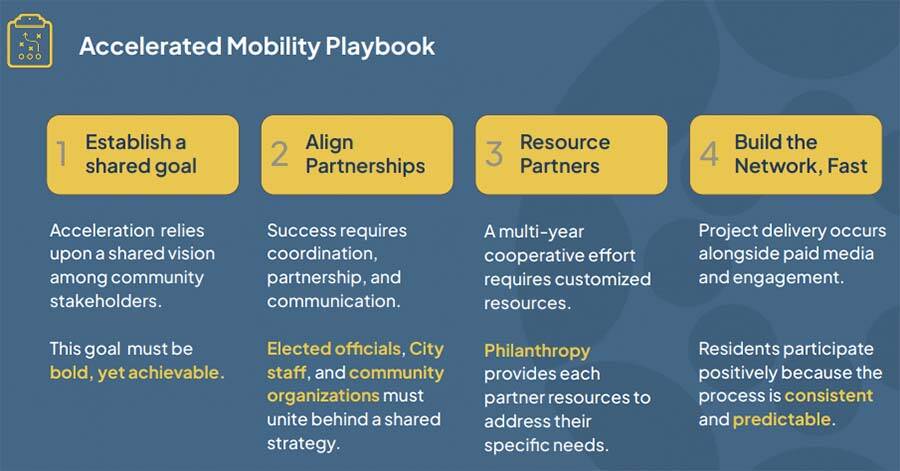If you want to get people out of their cars and encourage them to bicycle or use other modes of transportation you have to talk to them first.
According to expert Kyle Wagenschutz of City Thread, Bainbridge Island has not done that. “I don’t see that the primary audience has a place at the table,” he said at a recent City Council meeting.
He said BI’s Sustainable Transportation Plan focuses too much on current riders. “It’s not about getting those people to do what they’re already doing,” he said.
Wagenschutz said BI has to cast a wider net to bring people in who would be doing something for the first time. He said the city needs to create an environment where all people feel comfortable. BI needs to create a structure that actually motivates the behavior the city seeks.
He said BI can tap into that broader audience by explaining these projects have value even if they never actually use them. “You’re not going to be forcing them to take another mode of transportation,” he said. “It’s good for people who are driving.”
City Thread developed an Accelerated Mobility Playbook for BI. The playbook also says while there are community groups that support STP poor communication stifles broader support. On the positive side, City Thread says BI has the strategy in place with the STP and the right people in the Public Works Department for the project to be successful.
Wagenschutz said the council has passed a revolutionary transportation plan but has not always supported its expert staff recommendations. “Make sure plans are advancing with a shared vision,” he said. “Make sure all are on the same page; there’s nothing more confusing” than if they aren’t. He added that the public should always be involved in the conversation, not just during projects, “but do it always.”
Councilmember Joe Deets said when he was campaigning he heard over and over again that residents want walking trails and bike paths. “The people are there. They are interested. How do we reach them?”
Mayor Brenda Fantroy-Johnson said they tried to get out into the community. She also said, “No single organization knows what’s best for everyone on the island.”
City Thread has helped five cities construct 335 miles of new bikeways in two years. Its PowerPoint presentation says mobility helps with population growth, traffic congestion, housing affordability, climate change, job access, street safety, air quality and public health.
To be successful projects must have a shared goal with buy-in from all stakeholders. Trust must be built among partners. Partnerships must be aligned among elected leaders, city staff and residents. Communication campaigns must build support. Partners must promote the project. Public engagement, planning, design and construction activities must be identified. And networking must be built quickly while interest is high.
Waste reduction
City manager Blair King again discussed updates for BI’s waste reduction law. The main change is removing a 25-cent disposable cup fee and would also create an annual list of home compostable disposable food service ware. Items would need to be available from at least two manufacturers, cost 15% or less more than comparison products and meet Ecology leak/grease resistant standards.
It would also eliminate the need to request disposable products, add an exemption for items used to wrap hot foods and add language to make reasonable accommodations for people with disabilities. Cups and single-use products no longer would have to be requested or hidden from view. Next steps include business outreach, council review and public education.
Deets said it’s a “radical change” from what the council decided some time ago, but “we got an earful” of complaints so pulling back was necessary. He did encourage people to keep a portable cup in their cars so they won’t have to use a disposable cup.
Councilmember Leslie Schneider said BI had a major win in that even McDonald’s is going to fill reusable cups. “We got a large corporation to understand what our goals are, and that’s just huge to me.”
Fantroy-Johnson said another big win for BI was “a lot of businesses really felt like we wouldn’t listen to them, but we are here to help them. We want to collaborate and work together.”
Solid waste
Also at the meeting, actions were recommended related to solid waste management. A matrix has been developed listing opportunities and constraints concerning environmental, financial, social, regulatory compliance and planning goals, and level of service in 16 areas.
Those areas are: Mandatory 3-stream waste collection; construction and demolition ordinance; contamination enforcement; solid waste management planning; waste audits; community partnership; public outreach and education; congregated waste receptacle space; edible food recovery; food donation tracking; household hazardous waste and e-waste program enhancement; narrow streets collection; reuse business support; Washington Utility and Transportation Commission rate-setting and regulation; city-owned and operated; contract collection service with city rate-setting control; and contract collection service with WUTC control over rates and billings.
At the meeting, the council only decided to offer a contract to Bainbridge Disposal. And it plans to look at its waste stream for the 2025 budget.
Suyematsu Farm
The council voted to remove a portion of the Suyematsu Farm from the master lease with Friends of the Farm signed in 2011 and revert management back to the city. The city owns seven parcels and 40 acres of farmland on BI, including Suyematsu, which in 2016 became a historic district. Deputy city manager Ellen Schroer said the agreement required “a lot of compromise on both sides.”



